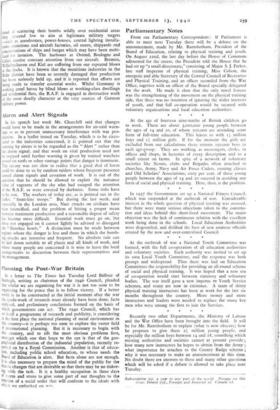Alarm and Alert Signals
In his speech last week Mr. Churchill said that changes would have to be made in the arrangements for air-raid warn- ings so as to prevent unnecessary interference with war pro- duction. In a leaflet issued on Tuesday, which is to be circu- lated to the industries concerned, it is pointed out that the warning by sirens is to be regarded as the " Alert " rather than the alarm signal, and that work on vital production need not be stopped until further warning is given by trained watchers posted on roofs or other vantage points that danger is imminent. The enemy was not slow to realise that a good deal of harm could be done to us by random raiders whose frequent presence caused alarm signals and cessation of work. It is out of the question that he should be allowed to exploit the nuisance value of vagrants of the sky who had escaped the attention of the R.A.F. or were covered by darkness. Some risks have to be run. The workers of today are, as is pointed out in the leaflet, " front-line troops." But during the last week, and especially in the London area, Nazi attacks on civilians have been intensified, and the problem of hitting a proper mean between maximum production and a reasonable degree of safety has become more difficult. Essential work must go on, bht those not engaged on it cannot lightly be advised to disregard the " Banshee howls." A distinction must be made between regions where the danger is less and those in which the bomb- ing attacks are intensive and frequent. No absolute rule can be laid down suitable to all places and all kinds of work, and where many people are concerned it is wise to leave the local arrangements to discussion between their representatives and the management.


























 Previous page
Previous page